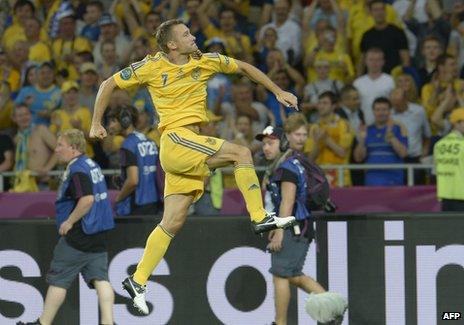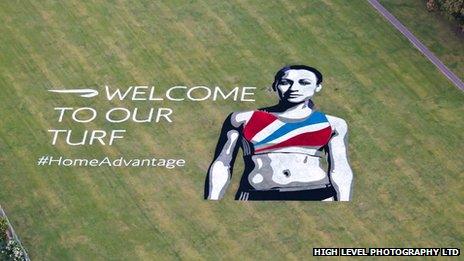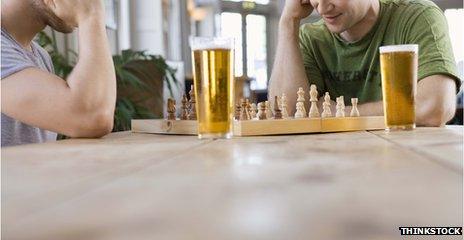Euro 2012: England v Ukraine - The science of home advantage
- Published

England's crunch Euro 2012 group game will see a stadium in Donetsk packed with as many as 48,000 Ukrainians. Sadly for England, home advantage is real, writes psychologist Ian Robertson.
Ukraine are playing at home and we all know that teams are more likely to win at home than away.
In the <link> <caption>2000-01 season English league</caption> <url href="http://oak.ucc.nau.edu/propper/bio425_docs/testosterone%20home%20court%20advantage.pdf" platform="highweb"/> </link> , of the matches which did not end in draws, 60% were won by the home team. There are several reasons for this - crowd support, local playing conditions and the effects of travel, among them.
But there is something more fundamental and primitive in play for the home advantage, and the bad news is that Ukraine are likely to benefit disproportionately from this. Let me digress in order to explain why.
On a tour round Chelsea's Stamford Bridge ground, our guide proudly showed me and my sons the lockers in the visiting team's changing room, which were tiny squares at floor level. A visiting footballer would have to get on their knees before the game, heads down, to squeeze their designer clothes and jewellery into the very small space.

However apparently trivial this might seem, this was a clever and ruthless move by Chelsea. They were forcing their opponents to adopt a primitive posture of submission.
Defeated mammals make themselves small, as you can see in the cowed, tail-between-the-legs and head-down posture of any beaten dog.
Football players are no different, as we saw vividly in the curled-up misery of the Bayern Munich players after their defeat by Chelsea. Victorious animals and humans in contrast make themselves big - arms and chest out, taking up as much space as possible - a primitive display of dominance.
Victory boosts testosterone but what is less well known is that merely adopting some of the trappings of victory - faking a chest out, arms and legs spread "power posture", for instance - <link> <caption>also boosts testosterone, Dana Carney and her colleagues from Columbia and Harvard Universities showed</caption> <url href="http://pss.sagepub.com/content/21/10/1363" platform="highweb"/> </link> .
This is why Chelsea's changing room ruse was so cunning. By making the visiting team curl up in a head-down posture of defeat, they were likely reducing testosterone levels in the players and also unconsciously priming their minds with defeat.
Testosterone levels predict victory in all sports, in financial market trading, and even in chess competitions, which brings us back to Ukraine and England.
The home advantage in football depends on testosterone, a hormone which boosts aggression, motivation and competitiveness, <link> <caption>Nick Neave and Sandy Wolfson of Northumbria University showed</caption> <url href="http://oak.ucc.nau.edu/propper/bio425_docs/testosterone%20home%20court%20advantage.pdf" platform="highweb"/> </link> . The primitive territoriality of playing on your home ground turbo-charges testosterone levels and this in turn makes the home team more likely to win.
So what exactly is happening to the brain to create this home advantage? Strange as it may seem, a California mouse offers an answer.
Matthew Fuxjager and his colleagues at the University of Wisconsin-Madison let male mice chalk up three rigged "wins" against other mice and then after a fourth win, studied how many "androgen receptors" there were in key parts of their brains. Androgen receptors are receiving stations for testosterone, and the more there are of them, the more powerfully any single spurt of testosterone will affect the brain.
Fuxjager and his team discovered that winning a series of contests boosted the number of androgen receptors in a part of the brain that controls social aggression - this is the winner effect.

Testosterone levels could affect the outcome of this game
It also increased the number of these receptors in a part of the brain's reward and motivation network, called the nucleus accumbens and the ventral tegmental area.
But then Fuxjager and his colleagues discovered something quite strange. They showed that the mouse showed a brain-boosting winner effect only after besting opponents on the winner's home territory. Contests won away from home did not help him in subsequent contests. What was going on here?
The answer is that while the androgen receptors in the social aggression part of the brain blossomed after all the victories, whether on home ground or away from home, this was not true of the androgen receptors in the motivation parts of the brain.
Only after the home victories did they swell in number, and not after away-match triumphs. What's more, it was only the brain-motivation area changes that correlated with the ability to win. Ukraine's victory against Sweden on home territory then, if we can generalise from a California mouse, should have re-engineered their brains' motivation centres to make them a much more formidable force for England to face on Tuesday.
And there is even more bad news for the England team - the home team advantage is much greater in some countries than in others. Eastern European and Balkan countries, including Ukraine, have much higher home advantage levels than northern European countries like England and Denmark, Richard Pollard of California Polytechnic showed, and where the national rivalry is big, this will ramp up testosterone levels even more. Neave and Wolfson demonstrated this.
So England are facing a treble whammy - a competitor with the home advantage, which has had a recent victory at home (although also a bad defeat against France), and of a national identity primed to benefit disproportionately from playing at home.
But not all the cards are stacked against England. Donetsk was founded by a Welshman and is often said to be very pro-Russian in its beliefs and outlook, so maybe these will dilute some of the home advantage effects.